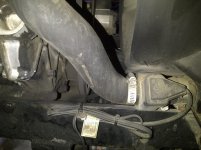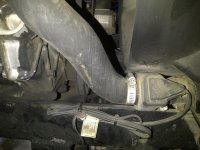Hi everyone - thanks for all the helpful posts!
Sorry its been so long since replying, but wasn't able to get at the tractor again until the weekend. Found out something had pushed the front grill in just enough to keep the hood latch from opening, had enough natural light and flashlight to see what was going on and how to jimmy it open. The batter was getting pretty weak after my last try to start it, so needed to get the hood open and put a trickle charger on the battery.
I can confirm the block heater works just fine - however, it is not actually heating the block. The heater is located on the coolant hose running out of the bottom of the radiator, not in the actual block. I guess the hope was that enough heat transfers through the stationary liquid to warm up the block.
Tried to load a picture of this but things are not cooperating. I've left the code in below that the Insert Image tool put in. Hoping that it appears as a picture for the rest of you.

Points well taken on the ether - will not be trying this.
Poorly winterized fuel could very well be the problem. Things are warmer now (-14C / 7F) so should be able to start it tomorrow with a fully charged battery and block heater on overnight. Next time I get into town will be getting some winter fuel conditioner and start the tractor again to make sure treated fuel is in all the lines. I changed all the filters in August 2014, so the new OEM fuel filter has less than 20 hours on it. Actually - I missed the air filter now that I think about it. That probably isn't helping. I will take it off to improve air flow on startup, but get a replacement soon. I like the air dryer idea - will have to get the wife out to help on that one. That should cost me a dinner out at the very least.
Someone asked how long I had it running last and how did it run: the day before the problem, the temperature was warmer (about -22C) and just barely got the tractor started after about 2 minutes of cranking. The tractor ran fine after that. I kept it at 1800rpm while I plowed snow around for over an hour. It ran well, no issues. The engine temperature indicator never made it as high as the usual operating temperature, but I expect that is normal when ambient temperatures are this low.
This page has seen a lot of hits so am guessing lots of people have danced with this problem or expect to at some time in the not too distant future. Will post an update tomorrow.


